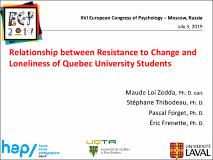Relationship between Resistance to Change and Loneliness of Quebec University Students

Editeur(s) scientifique(s)
European Federation of Psychologists' Associations, Lomonosov Moscow State University, Faculty of PsychologyType de référence
Date
2019Langue de la référence
AnglaisEntité(s) de recherche
Résumé
Changes are an integral part of our society including the education community (Gather Thurler, 2000). Resistance to change is known to be one of the main reasons for failures in changes (Kotter and Schlesinger, 1979). The university environment is not immune; as even students can resist changes (Barack, 2017; Oreg, 2003). This resistance not only may result in negative emotions such as resentment, stress, fear, or anxiety, but also decrease the individual's affective commitment and performance (Armenakis et al., 2007). Loneliness is a factor affecting university students’ quality of life, as often reported in research (e. g. McIntyre et al., 2017; Ozben, 2013; Stoliker and Lafrenière, 2015). In addition, loneliness is perceived by authors as a factor that may influence resistance to change (Harvey and Broyles, 2010; Martin and McGrevin, 1990; Smith and Scott, 1990). However, to the author knowledge no studies seem to study the relationship between these two concepts. Based on these considerations, the objective of this study is to determine whether there is a relationship between loneliness and resistance to change among university students. Two hundred and ninety-four undergraduate university students participated in the study from the faculties of Physical Activity and of Education, and Schools of Business and of Engineering. The French-Canadian translation of the UCLA Loneliness Scale 3 (Lussier, 1992) and the cross-cultural validation of the Resistance to change scale (Loi Zedda, Thibodeau, Frenette and Forget, 2018) measured the concepts of loneliness and resistance to change respectively. The results reveal the existence of weak positive relationships between some dimensions of loneliness and some dimensions of resistance to change (correlations ranging from 0,19 to 0,25). These results are discussed in the light of the cognitive theory of loneliness (Perlman & Peplau, 1982) and the theory of resistance to change (Oreg, 2003).Titre de l’ouvrage principal
Book of Abstracts: XVI European Congress of Psychology (ECP 2019) (2‒5 July, 2019, Lomonosov Moscow State University, Moscow)Maison d’édition
Moscow University PressVille d’édition
MoscowPays d'édition
RussiaEvaluation par les pairs (peer reviewing)
ouiPortée nationale / internationale
internationalePagination
741-742Nom de la manifestation
XVI European Congress of Psychology (ECP 2019)Date(s) de la manifestation
2‒5 July 2019Ville de la manifestation
MoscowPays de la manifestation
RussiaParticipation sur invitation
ouiURL permanente ORFEE
http://hdl.handle.net/20.500.12162/2932Autre(s) URL(s) permanente(s)
https://elibrary.ru/item.asp?id=41287061Document(s) associé(s) à la référence
Texte intégral :
Fichier
Accès
Commentaire
Version
Taille
- Tout ORFEE
- Détail référence



